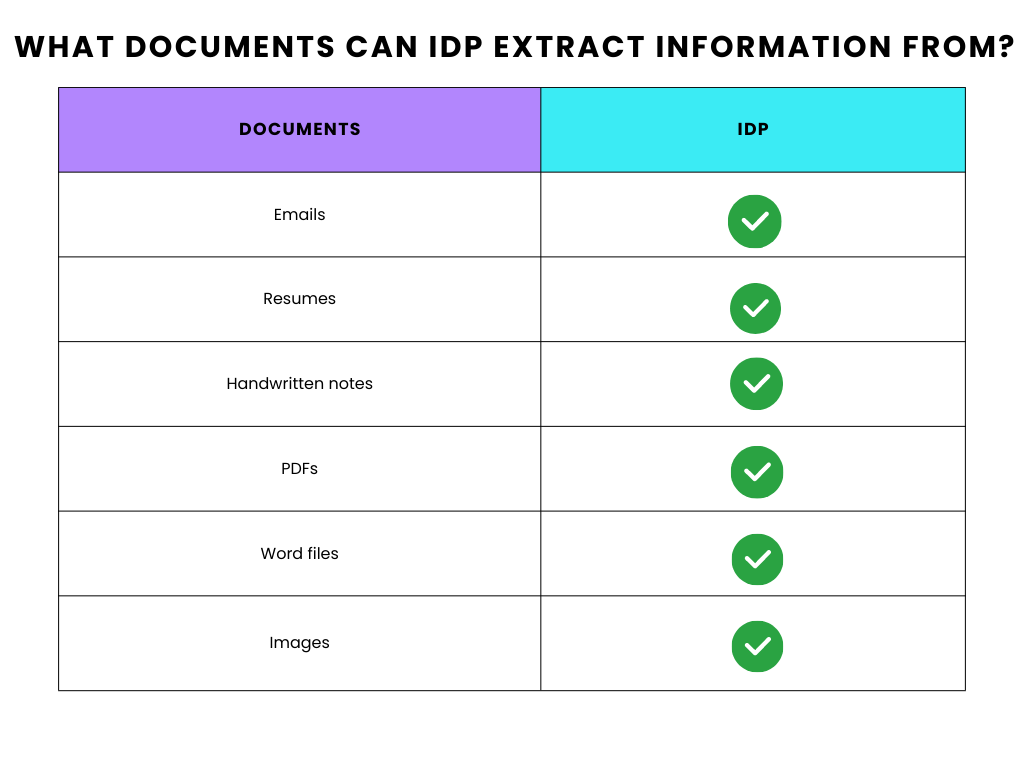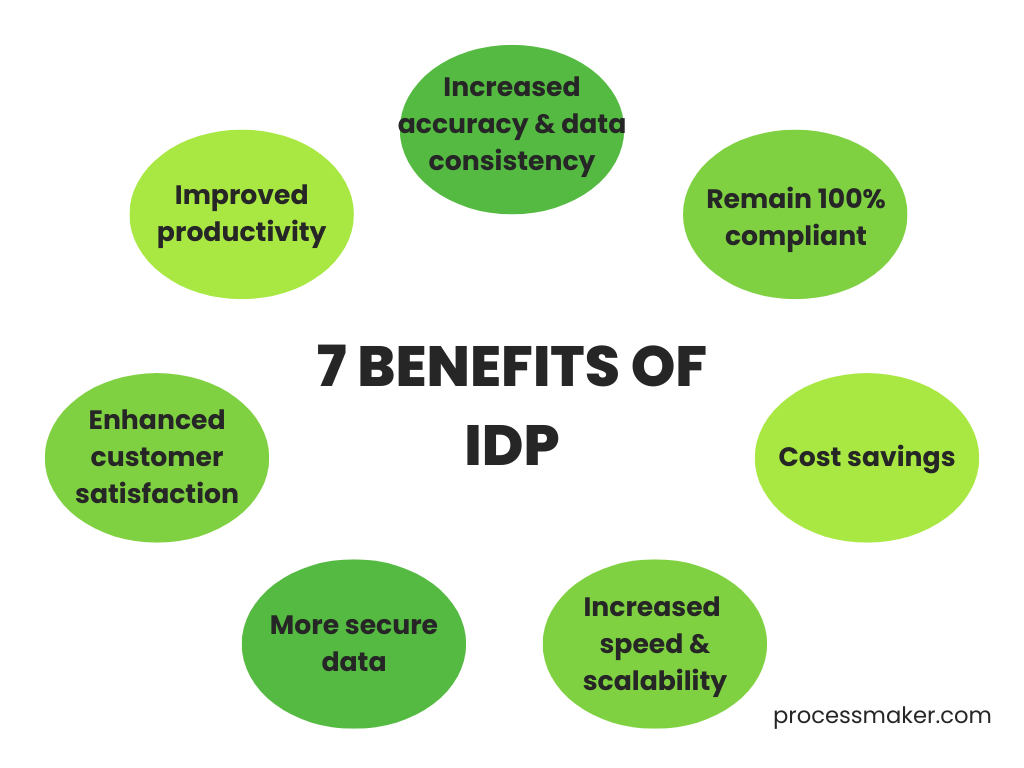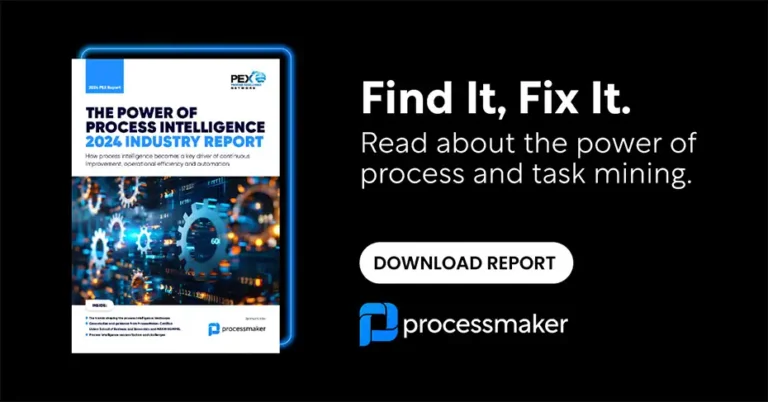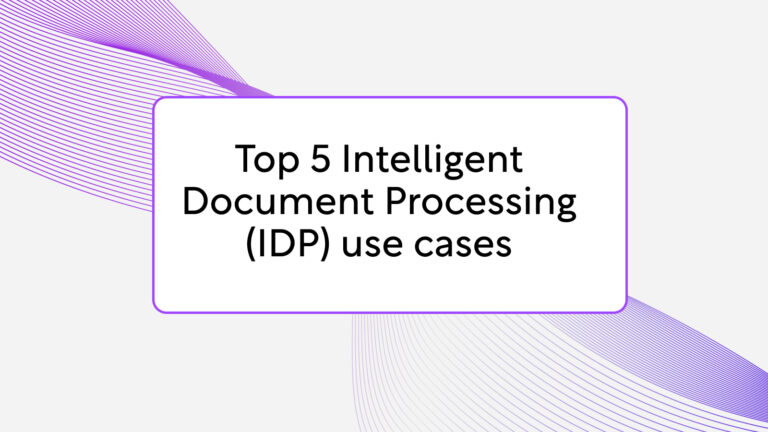Imagine a colossal library filled with uncategorized books and documents. Normally, librarians would manually organize and extract information from this chaos—a process that’s often time-consuming and error-prone. Enter our advanced librarian: intelligent document processing (IDP).
IDP is equipped with state-of-the-art tools like natural language processing and machine learning, just like our expert librarian who meticulously notes key details like names and dates. This intelligent system scans every page and word of each new document, understanding and classifying them for easy retrieval.
Beyond the library, in this article we’ll discuss:
- The definition of intelligent document processing (IDP)
- How intelligent document processing (IDP) works
- The benefits of intelligent document processing (IDP)
- Intelligent document processing (IDP) tools and technology
What is intelligent document processing?
IDP is a set of technologies that automate the processing of documents, leveraging the power of artificial intelligence, machine learning, and computer vision to extract, interpret, classify, and transform information into actionable data.
Similar to a librarian, IDP performs the following tasks:
- Extracts information
- Categorizes information
- Releases that freshly classified data back into your processes
One of the key advantages of IDP is its ability to handle a wide variety of unstructured document formats, like scanned images, PDFs, emails, and presentations.

This means that you can automate the processing of paper-based documents and digital documents alike, reducing the time and resources required to process them manually.
Like a new employee at the library, IDP learns and improves over time through experience. Its algorithms become more accurate and efficient as the system processes more documents, continuously improving overall speed and accuracy.
How does intelligent document processing work?
IDP can be used to automate many types of document management processes such as the following:
- Employee Onboarding: IDP will take care of verifying, interpreting, and extracting the data from documents that are uploaded as part of an employee onboarding process, so you never have to worry about manually verifying attached documents.
- Account Opening: IDP will classify documents so that your agents do not have to waste valuable time manually verifying whether the correct documents have been uploaded as part of an account opening process.
- Contract Management: IDP can automatically scan repositories of contracts to understand termination dates, evaluate risk based on the language used in the contract, determine if your company is complying with committed insurance premiums and so much more.
Here’s how it works: Imagine the library receives shipments of content from a variety of sources. While some of these shipments are novels, others are picture books, essays, and films—all of which will need to be categorized and submitted to the library’s database.
IDP takes the reins and sorts through all of this unstructured data for you, whether it’s emails, images, or handwritten notes.
The top benefits of IDP
Intelligent document processing is helping industries from banking to higher education improve control over their data. What benefits are IDP adopters enjoying most?
1. Increased accuracy and data consistency: IDP eliminates the risk of human error in interpreting and transcribing data, leading to improved accuracy and consistency of data—essential for effective decision-making and risk management. Just as it’s easier to ensure all books are in order when stored electronically, IDP ensures data accuracy.
2. Improved productivity: IDP automates the manual process of reviewing unstructured data to extract meaningful information. This allows employees to engage in more valuable work which leads to increased productivity and efficiency. An added benefit? Improved job satisfaction for employees hungry for more meaningful responsibilities—a pro tip for cultivating a more engaged workforce.
3. Enhanced customer satisfaction: IDP reduces turnaround times in customer-facing business processes where customer documents need to be reviewed. This review can now be done much more quickly and accurately. This can free up employees to focus on white-glove service vs. data entry. This improves customer satisfaction, as well as increases loyalty and repeat business.
4. More secure data: Configure to meet specific security requirements, ensuring that sensitive information is protected from unauthorized access. Besides being able to interpret and extract data, IDP can also mask sensitive information as part of its review so additional employees won’t have access to certain fields. This is especially important for organizations that handle sensitive personal information—like banking or healthcare.
5. Increased speed and scalability: Since IDP can process large volumes of documents using limited resources, it is infinitely scalable. Accommodate growth into new markets and expand the number of accounts you can take on without increasing their headcount.
6. Cost savings: By automating the time-consuming process of document processing, IDP can reduce the costs associated with manual data entry, such as labor, training, and equipment. Even more importantly, with worldwide labor shortages affecting many industries, this process can be done by AI instead of a worker.
7. Remain 100% compliant: IDP can improve regulatory compliance by creating more efficient and predictable business processes. This provides for better overall compliance with the following regulatory requirements:
- GDPR (General Data Protection Regulation) is a new EU law that requires organizations to comply with specific standards when it comes to personal data management.
- HIPAA (Health Insurance Portability and Accountability Act) requires healthcare providers, insurance companies, and other businesses dealing with sensitive medical information to protect it from unauthorized access.
- SOX (Sarbanes-Oxley Act) applies specifically to publicly traded companies and dictates how they should manage their accounting practices.
- PCI DSS (Payment Card Industry Data Security Standard) sets security standards for merchants who accept credit cards online or over phone lines.

Tools and technologies of IDP
Now, let’s look at the tools and technologies that power the benefits of intelligent document processing:
Natural language processing (NLP)
Like a librarian’s understanding of content, NLP algorithms analyze text, identify key topics, and classify documents based on their content and context. Once your document is transformed into a machine-readable format, IDP can use natural language processing (NLP) algorithms to analyze the text and identify key topics. NLP helps computers grasp content the way a human would while giving them a hand with nuances like idioms and attitude. The text of your document can then be classified based on its content and its context.
Optical Character Recognition (OCR)
OCR is a handy technology that can strip characters, numbers, and words from a PDF or image. You may see this technology in action on your smartphone. Take a photo of a book page or the instruction sheet from a board game. With most newer phones, the text within the image becomes independently editable—you can copy and paste the words into a text message or Word document.
Artificial Intelligence and Machine Learning (AI and ML)
Artificial intelligence and machine learning are at the core of IDP. IDP takes the output of OCR and then it interprets it by using language models to understand the documents. This understanding allows IDP to both classify the documents and find meaningful data to extract. Now every document whether it is an email, a PDF, an image, or a video can provide meaningful structured data that can be used to make decisions in business processes.
Just as IDP revolutionizes the way we work with documents, much like how librarians streamline access to knowledge, organizations can achieve greater efficiency and accuracy with IDP’s automation capabilities. Embracing IDP can amplify decision-making with valuable insights. As the future of document processing, it’s time for organizations to explore the many benefits of IDP and embrace its transformative power. Just as our expert librarian is ready to help you navigate the library’s resources, our team stands ready to help organizations leverage IDP for smarter, more efficient work processes.





